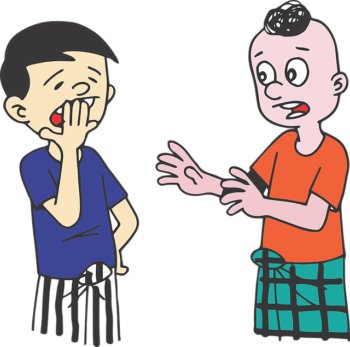Right now, it’s nearly impossible to have a conversation about current events without someone bringing up confirmation bias, which is when people only consume news that supports their already-held beliefs.
Whether you believe confirmation bias is a product of nefarious forces, hyper-focused algorithms, or our mankind’s natural social instincts, it’s clear that (for many of us), our deepest-held beliefs heavily influence the information we consume.
 I believe there’s another bias though that takes place before confirmation bias even has a chance to set in: I call it, intuition bias.
I believe there’s another bias though that takes place before confirmation bias even has a chance to set in: I call it, intuition bias.
Intuition bias is when you’re so sure of your own ability to discern truth that you don’t even bother to consume a news story, you simply look at the headline and accompanying photograph then assume you’ve pretty much got the gist.
I text articles to friends who respond so quickly I know there’s no way they actually read it. These knee-jerk reactions are often way off base, but more often, they pretty much get it right.
I’m as guilty of intuition bias as anyone else, but I always acknowledge the extent of what I’ve heard from reputable sources and the parts I just assumed.
So when someone asks me what I think of a news story I’ll often reply with something like, “Well I’ve only seen the headline, but it seems outrageous!” Or, “Perhaps I’ll click later but if any celebrity’s gonna rock quarantine with stay-at-home style, it’s Jenna Bush Hager.”
Next time you find yourself readily agreeing that the news is too misleading, ask yourself: WAS the news too misleading, or did you just see a tiny snippet out of context and mislead yourself?
All of this is just a long way of justifying the fact that I’m about to devote the rest of this column to a topic I know absolutely nothing about.
It isn’t that weird. We all do it with the news and now I’m doing it with a complex psychological theory. I may be wildly off-base to anyone who actually knows about the topic, but my take feels true and that’s a passing standard nowadays.
The topic is: meta-emotions.
I recently learned about meta-emotions while reading the book Permission to Feel: Unlocking the Power of Emotions to Help Our Kids, Ourselves, and Our Society Thrive by Marc Brackett, Ph.D.
This should not be confused with the similarly-named book Permission to Feel: Unlocking the Career-Destroying Power of Cell Phone Cameras by Honkin’ Al Franken.
Meta-emotions are how we feel about our feelings.
The examples Dr. Brackett provides include being afraid of public speaking and then being embarrassed about being afraid, and, feeling victimized because you’re being bullied and then being ashamed of yourself for allowing that to happen.
Understanding the meta-emotions we’re experiencing is pivotal to accurately assessing ourselves and pursuing optimum well-being.
Since learning about this concept, I now see meta-emotions everywhere in my day-to-day life. But it’s always the same emotion: resentment.
In fact, I resent having any emotions whatsoever. Sure, I understand that emotions create all meaning and purpose in life, but I just feel put upon by them.
Sometimes life feels like a surprise party I was tipped off about beforehand and now I’ve got to play the whole thing out or I’ll seem like a jerk.
Nobody who goes through the trouble of throwing a surprise party expects the honoree to react with a simple, “Oh.. hey guys,” just like nobody who tells you their dog just died expects you to say, “Oh.. sorry,” even though that’s been my reaction to every single dog death I’ve ever learned about.
It’s ridiculous how often I feel pressured to amp up my emotional response. Examples include returning big greetings (“It’s SO good to see you!”), the quality of food someone else has cooked (“Everything tastes AMAZING!”), and looking at pictures of someone else’s kid (“Too CUTE!”).
Most of my social interactions largely follow paths of conventional thinking that are often easier to follow than upset. I’m like an overeager improv actor “yes and-ing” my way through life.
 A few things I’ll readily agree to just to keep things moving include: “It IS crazy how long this line is!,” “some people just DON’T get it!”, and “that never would’ve happened when we were kids.”
A few things I’ll readily agree to just to keep things moving include: “It IS crazy how long this line is!,” “some people just DON’T get it!”, and “that never would’ve happened when we were kids.”
Complete strangers constantly look to me for validation of their personal perspectives and, more often than not, I readily supply it just to keep them happy.
But now that I’m aware of that, it’s starting to change.
I’ve drawn a few small lines in the sand of social cliches I’ll no longer endorse. For starters, you’ll never hear me blame the calendar year 2020 for weird or unexplained phenomena. That just shows an incredible ignorance of history.
I no longer shrug with a “whatchya gonna do?” expression when people complain about government agencies, teachers or schools.
Also, boys will not “be boys,” girl’s aren’t “always so emotional,” and everyone’s not “just looking for a handout.”
I’ve turned my overriding meta-emotion into a meta-meta-emotion. Instead of resenting the emotions I have, I now resent the social situations that cause the resentment in the first place.
Rounding the corner on forty, it feels like I’ve seen enough of life to get the gist so from here on out I’m just gonna call it like I see it and follow my intuition. What could possibly go wrong?
If you enjoy my humor writing, please subscribe below.
If you want to syndicate this column, you may contact me here to discuss the details.
You may notice that I’ve disabled commenting on this post. I’d love to hear your thoughts by email at [email protected].